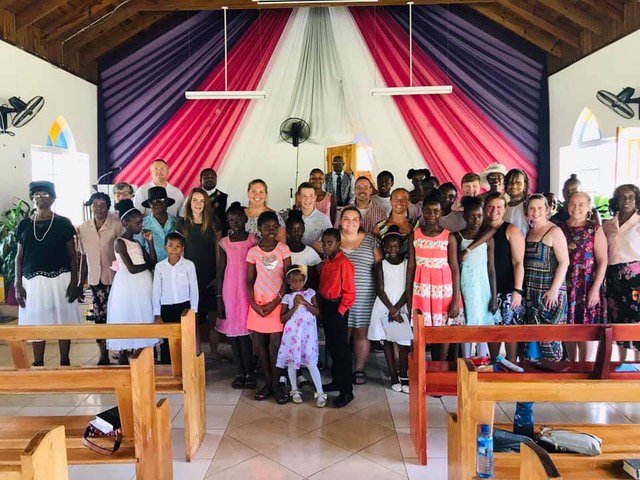What Should We Do?
By Bishop Chris Giesler
Advent is different than Christmas. For instance, right now, you can purchase Christmas cards at just about any store, but I have yet to see even one Advent greeting card. But if an Advent greeting card were available, perhaps on its front, there might have a picture of the poster child of Advent. And who, you might ask, is Advent’s poster child? It is, of course, John the Baptist. Remember John; he’s Zechariah and Elizabeth’s son – the one who leaped in his mother’s womb when a pregnant Mary came to visit.
To be brutally honest, John was not somebody you wanted to mess around with. Matthew’s Gospel describes him this way: Now John wore clothing of camel’s hair with a leather belt around his waist, and his food was locusts and wild honey. In other words, John did not shop at Joseph A. Banks and did not dine at the fanciest restaurant in town. Wall-Mart and McDonald’s would have been a stretch for John. The fact that locusts and wild honey were part of his diet meant that he ate what he could get his grubby hands on. He lived off the land and was most likely homeless.
But as crazy as it seems, John and his message form the very essence of the Advent message:
Matthew gives us this account of his preaching:
In those days, John the Baptist appeared in the wilderness of Judea, proclaiming, “Repent, for the kingdom of heaven has come near.” This is the one of whom the prophet Isaiah spoke when he said,
“The voice of one crying out in the wilderness: ‘Prepare the way of the Lord, make his paths straight.'”
Luke’s Gospel expands that quote from Isaiah by saying:
Every valley shall be filled,
and every mountain and hill
shall be made low,
and the crooked shall be made straight,
and the rough ways made smooth;
and all flesh shall see the salvation of God.
So, work with me here; what might an Advent Greeting Card look like?
A picture of John should adorn the front cover of this card. This, of course, would be a strange sight because Joh is hardly gentile in appearance.
With John’s portrait gracing the front of our card, what would it say on the inside? Perhaps this quote from Matthew’s Gospel would work:
“You brood of vipers! Who warned you to flee from the wrath to come? Bear fruits worthy of repentance. Do not begin to say to yourselves, ‘We have Abraham as our ancestor; for I tell you, God is able from these stones to raise up children to Abraham. Even now the ax is lying at the root of the trees; every tree therefore that does not bear good fruit is cut down and thrown into the fire.”
Now you see why we don’t have Advent greeting cards. We’ve got a screaming prophet in funny clothes calling all who would listen a brood of vipers, and he is telling them. What does it mean to bear fruits of repentance?
Repentance is different from confession, but sometimes we confuse the two.
Confession is the act of admitting that we are wrong. It is not just about finding an excuse for what we might have done; it is honestly acknowledging that we have done wrong and giving voice to it. That is step 1. Step 2 is repentance, the act of changing course in our lives. Changing the way we live, changing the way we view the world. Confession is admitting we are wrong, and repentance is changing our way of acting so that we don’t repeat our past mistakes.
In Luke’s account of John’s preaching, he shares the dialogue that John has with those who have come to listen and are interested in responding.
There we read:
And the crowds asked him, “What then should we do?” And John said: “Whoever has two coats must share with anyone who has none, and whoever has food must do likewise.” Even tax-collectors came to be baptized, and they asked him, “Teacher, what should we do?” He said to them, “Collect no more than the amount prescribed for you.” Soldiers also asked him, “And we, what should we do?” He said to them, “Do not extort money from anyone by threats or false accusation, and be satisfied with your wages.”
So if John were here today, what do you think he might say if we asked him what we should be doing?
- Employees, don’t cheat your company. Give an honest day’s work, care for those who work with you, and look out for your customers’ needs.
- Employers, don’t take advantage of your employees; pay them as well as you can so that they can support their families.
- Husbands and wives, honor your spouse, serve them as Christ does the church, and love each other with the same unconditional love with which Christ loves you.
- Children, respect your parents and honor them with your obedience. Parents, love your children as the gifts from God that they are. Do all you can to empower them to serve the Lord with gladness.
- Teachers know your subject matter well and teach with a passion – care for your students.
- Those of you working in the medical profession, have compassion for the suffering of those that come to you for help and healing. Remember that they are human beings with an illness, not the other way around.
- Church members: Support your congregation with your best effort. Give in terms of your time, sharing your talents, and giving of your treasures. Strive to tithe so that your congregation can fully engage in its mission.
Fundamentally, this begins with a desire to have the presence of God to break into our lives in such a way that our view of the world changes to be more like the perspective of Christ. This then calls us to help usher into existence the very kingdom of God.
And what might that kingdom look like? The prophet Isaiah gives us this vision:
The wolf shall live with the lamb,
the leopard shall lie down with the kid,
the calf and the lion and the fatling together,
and a little child shall lead them.
The cow and the bear shall graze,
their young shall lie down together;
and the lion shall eat straw like the ox.
The nursing child shall play over the hole of the rattlesnake,
and the weaned child shall put its hand on the serpent’s den.
They will not hurt or destroy
on all my holy mountain;
for the earth will be full of the knowledge of the Lord
as the waters cover the sea.
Here is what John’s Advent greeting comes down to, we need to straighten the road for God to come into our hearts. It is hearing the call of John to care for those who are at the margins. And working together within the Church, we strive to see that the kingdom of God can be present in the world today. This will make the celebration of Christmas all the more meaningful.







